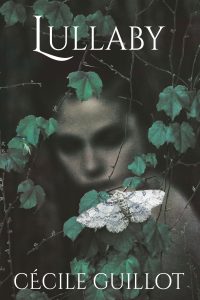
Cécile Guillot
Trepidatio Publishing (January 5, 2024)
Reviewed by Nora B. Peevy
Cécile Guillot wrote a beautiful and haunting short story, “Lullaby,” which resonates deeply with me for personal reasons. I am going to share them here because they relate to the plot; I have kissed more than a few women because I am bisexual; I write horror; I have been institutionalized twice for suicidal tendencies and severe depression, once as a teenager and once as an adult; I am a woman who speaks out for women’s rights, and as you find at the end of the story, which I will not give away, I also share Hazel’s painful childhood trauma. I chose forgiveness. She did not.
Thankfully, I was not alive in the 1960s when the barbaric Sakel Method (insulin shock called “rebirth”) or other treatment of women with such a lack of sensitivity and humanity existed. I realize the main characters in the story are me. This story is also about Lulla, a girl born with a deformed hand, thrown away as refuse by her parents to live in the institution because she is not the daughter they wanted.
Because Hazel is not able to author her stories, her imagination creates a beautiful world she, Jo, and Lulla escape to every evening, a beautiful fall garden with night blooming flowers and luna moths.
Institutions like this one used lobotomies, (The Sakel Cure) insulin shock, hydrotherapy, bromine injections; all, or a few of these methods were used until the 1960s and some still are today. In fact, The Sakel Cure, which is extremely dangerous, was used until the 1960s. It flabbergasts me that women suffered these horrors in institutions claiming to help and heal them for such normal behavior, but then I am aware throughout history we have suffered at the hands of a patriarchal society, though before the Christian Church and men took over, we were a matriarchal society in medieval times.
Guillot’s characters are struggling, grieving, angry women, which makes this story even more macabrely beautiful and believable. The ending is a gut punch to the stomach, which sadly, I also know myself. I felt like she authored this story for me, minus the terrible torture the women went through. It made me shudder. It made me furious. It made me cry for myself and every woman who has gone through this. And this is what enormously powerful writing does. When you read it, it rips your heart out by the roots, and you wail that humanity failed womanhood in such a beastly way without a voice or advocates to save us from such demonic monsters.
Hopefully, if there is a God or karma, these diabolical men suffered. I find it unforgivable to excuse their horrendous deeds. Guillot brought a voice to woman’s history sorely needed and timely in the world we are living in right now with women’s rights being chipped away at again. If we let men decide our future, who knows what will happen to us?








